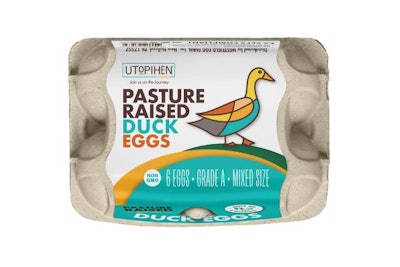
“It’s a movement, it’s not just an egg brand,” stated Weaver. The fourth-generation farmer helps his family lead the free-range and pasture-raised egg companies.
Utopihen Farms, umbrellaed under Nature’s Yoke, is a recently introduced egg-brand that’s objective is to emphasize the connections between family, friends and community, and create a “brighter tomorrow” with farmers, retailers and customers. Nature’s Yoke is a family-run business launched in 1963 by George Weaver l.
Meet the eggs
Between the two companies, multiple products have been developed for a tailored shopping experience including: Organic, Legacy and Omega-3 free-range eggs under Nature’s Yoke, and Organic, Duck, and Soy-Free eggs under Utopihen Farms. Farms are audited to assure compliance with USDA Organic standards.
Weaver stated that duck eggs contain higher levels of omega-3 fatty acids and protein compared to a conventional egg. Additionally, they exhibit a larger yolk to white ratio and a harder shell. Soy-free eggs were recommended for consumers who have a soy allergy or want a soy-free diet.
All eggs are sourced from 56 family-owned farms in Pennsylvania, with approximately 300,000 chicken layers and 60,000 duck layers in total. The eggs are sold up and down the East coast in various independent retailers, bakeries, and chain stores. A few of these include: McCaffrey’s Food Markets, Mom’s Organic Market, Earth Fare, C&S Wholesale Grocers, Four Seasons, Giant Food Company and Stop and Shop.
The standards
All Utopihen chicken egg products carry the Certified Humane® logo. While the term “pasture-raised” is not regulated by the USDA, it is defined by the HFAC (Humane Farm Animal Care). According to the HFAC, pasture-raised hens shall be outdoors year-round, and have housing where hens can go inside when needed, or for up to two weeks out of the year in the event of inclement weather.


















